Trump vs India: 50% Tariffs, Russian Oil Drama, and a Hint of Relief

Image via The Indian Express
August 17, 2025 | Washington/New Delhi
U.S. President Donald Trump made a dramatic remark on Friday, August 16, 2025, regarding his decision to impose an additional 25% tariff on Indian imports linked to its purchase of Russian oil. Speaking aboard Air Force One, Trump said, “Maybe I won’t have to do it,” suggesting that while he has the power to increase economic pressure further, he might hold back if India changes course. The statement came just days before his scheduled meeting with Russian President Vladimir Putin in Alaska.
Background: Why the Tariffs Were Raised
The United States had already imposed a 25% tariff on Indian goods earlier this year. The new round of tariffs, also at 25%, was specifically linked to India’s continued purchase and refining of Russian crude oil. Together, this brought U.S. tariffs on Indian products to a staggering 50%, one of the harshest levels in the history of bilateral trade.
According to the White House, the move was designed to curb India’s role in helping Russia’s economy at a time when Moscow is under heavy sanctions due to the war in Ukraine. Washington accuses India of refining discounted Russian crude and then reselling it to other markets, thereby providing indirect financial support to Russia.
Trump’s Remark: “Maybe I Won’t Have to Do It”
Despite imposing the tariffs, Trump signaled that harsher secondary sanctions might not be necessary. Speaking to reporters, he said, “If I have to do it, I’ll do it. Maybe I won’t have to do it.” The comment was seen as both a warning and a possible opening for dialogue.
Trump also declared that Russia had “lost an oil client” in India, suggesting that his strategy was beginning to succeed in squeezing Moscow’s trade partners. However, analysts pointed out that India continues to defend its energy policy, making the situation far from resolved.
India’s Reaction: “Unfair and Unjustified”
The Indian government responded strongly to Washington’s decision. Officials in New Delhi described the tariffs as “unfair, unjustified, and unreasonable”, adding that India’s oil policy is based on national interest and energy security.
India’s foreign ministry argued that buying oil from Russia helps maintain stability in the global energy market. With a population of 1.4 billion and rapidly growing energy needs, India maintains that its oil imports are not about aiding Moscow, but about ensuring affordable fuel for its citizens.
Trade and Diplomatic Fallout
The tariff escalation has strained U.S.–India relations, which had been improving over the past decade. Once celebrated as “good friends” on the world stage, Prime Minister Narendra Modi and President Trump now find themselves in a tense standoff.
Experts warn that if the dispute continues, India could tilt further toward Russia and China, which may weaken the U.S. strategy in the Indo-Pacific. This would also have long-term implications for defense cooperation, technology trade, and investment flows between the two democracies.
Former U.S. officials have already criticized Trump’s approach, calling it an “unforced error” that could isolate Washington while strengthening alternative alliances.
Global Reactions and Market Impact
The tariffs also sent ripples through global markets. Oil traders expressed concern that energy supply chains could become unstable if tensions worsen. The Indian rupee saw short-term pressure, while U.S. businesses that rely on Indian imports—such as textiles, pharmaceuticals, and auto parts—feared rising costs.
Russia, meanwhile, has remained silent but is expected to closely watch Trump’s upcoming meeting with President Putin. Analysts believe Moscow may try to deepen its energy partnership with India as a counter to U.S. sanctions.
Key Takeaways (SEO-Friendly Highlights)
- Date & Context: August 16, 2025 – Trump comments on Air Force One.
- Tariffs: Extra 25% tariff on India’s imports tied to Russian oil; total tariffs now 50%.
- Trump’s Statement: “Maybe I won’t have to do it” – hint at possible relief.
- India’s Position: Strong rejection, calling tariffs unfair; energy policy defended as essential.
- Impact: Relations strained; risks of India leaning toward Russia/China grow.
- Markets: Global oil traders and U.S. importers fear disruptions.
Why This Matters
This dispute is not only about trade; it is about geopolitics, energy security, and global alliances. For the United States, the tariffs are a tool to pressure Russia’s allies. For India, oil imports are a matter of survival in a world of rising fuel prices.
If Trump follows through with secondary sanctions, it could reshape international trade dynamics and possibly push India into creating parallel financial and energy systems with other non-Western powers.